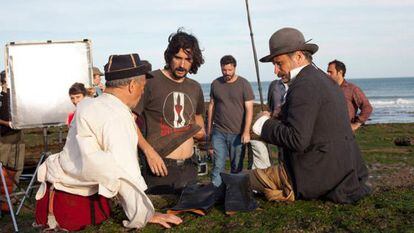Argentina becomes a Cannes powerhouse
With four films in competition for the first time, the nation’s government and press are celebrating But what has changed to bring its cinema back to life?


“We hoped for more after a great first showing, but it never grew,” Cannes Festival director Thierry Frémaux said about Argentina two years ago. “Argentinean filmmakers committed suicide. Pablo Trapero [a producer and director] is the only one who bets on different films without worrying about their success at the box office.”
This week four Argentinean films are competing at the 67th annual Cannes Film Festival. One of them, Wild Tales, the third feature-length film from director Damián Szifrón, was chosen as the official selection from Argentina. It will compete for the Palme d’Or along with 18 other works from established auteurs such as Canada’s David Cronenberg, France’s Jean-Luc Godard and British filmmakers Ken Loach and Mike Leigh.
The only other Latin American country represented at the festival is Colombia. Director Franco Lolli’s Gente de bien will compete in the parallel Critics’ Week section, which aims to discover new directors.
Meanwhile, Spain’s only entrants are a short film in Critics’ Week and Jaime Rosales’ Beautiful Youth, which will compete in the Un Certain Regard section, the second most important of the festival. This year its jury will be headed by Pablo Trapero.
The festival four
Wild Tales is competing for the Palme d'Or in the official selection. Directed by Damián Szifrón, it stars Ricardo Darín and Leonardo Sbaraglia.
Jauja will show in the Un Certain Regard sidebar. Directed by Lisandro Alonso, it features Viggo Mortensen, who also produced the movie.
Refugiado, directed by Diego Lerman, will show out of competition in the Directors' Fortnight.
Ardor, directed by Pablo Fendrik, is also showing out of competition.
Argentina produced four of the 60 feature films that were chosen from 1,700 candidates to be shown at Cannes this year. The country is competing in almost all sections and its representatives will lead three juries in two sections. Before they headed off to Cannes, President Cristina Fernández de Kirchner bade the filmmakers goodbye. “I think it is the first time [they have chosen four Argentinean movies],” she told them. “We are the government at that first time.”
Two ideologically opposed newspapers, Clarín and Página 12, celebrated the achievement with the respective headlines, “Argentina’s Great Year” and “Palms Together for Argentina.”
So what has happened? Did Argentina’s cinema come back to life in just two years or did the suicide never occur? Has it become more commercial or more independent? Hugo Sigman, the Argentinean businessman and producer of Wild Tales, told film magazine Haciendo cine: “The Argentinean films in the competition have very little in common. There is no prototype. Frémaux chooses quality and, in general, the least commercial are the best ones. But, I think he looks for quality and if they are commercial, even better.”
Hernán Guerschuny, the magazine’s editor and director of the film El Crítico, which premiered in Argentina this year, said it is the European festivals that have gotten more commercial. “Before they had more sponsors and now they are forced to think about business. They have to lure advertisers. And you do that by bringing people of great stature such as Ricardo Darín who stars in Wild Tales; Viggo Mortensen, who acts in and produces Jauja [directed by Lisandro Alonso]; and Gael García Bernal who stars in El ardor [directed by Pablo Fendrik].”
Guerschuny says there is one factor that explains the Argentinean wave washing up on the shores at Cannes and it is Ventana Sur, the main marketplace for Latin American cinema. The event is held in Buenos Aires. The National Institute of Cinema and Audiovisual Arts (INCAA) organizes showings with help from the government and in collaboration with Cannes’ Marché du Film, the business arm of the festival. “Those in charge of making selections and distributors from all over the world come to see these films they’ve never seen before,” Guerschuny says.
The Argentinean films in the competition have little in common. There is no prototype”
Focusing on the numbers, it is clear that the sector is experiencing a good moment. Marcelo Stiletano, a specialist in film who works for La Nación newspaper and Radio Continental, says there were record sales last year even though most people only saw a small number of films. But does the Cannes lineup mean Argentinean cinema is better than it was five years ago?
“There is more variety,” Guerschuny explained. “But I don’t think the Cannes lineup means that our cinema is better than three or four years ago.”
Mariano Llinás, the director of 2008’s Extraordinary Stories, is skeptical. “Cannes is the most popular of the festivals – not the most prestigious or the best. It gives people who have no interest in film the rest of the year an opportunity to say something about it and spend their time talking about ‘a great moment for Argentinean cinema’ and other nonsense. Those of us who are really invested in film know that these big ads are just superficial fanfare crafted by government employees and that our job is on the other side, at another time, and it does not depend on this circus. I am sure Damián Szifrón and Lisandro Alonso agree. This is just a simple media trick, a simple patriotic illusion. Nothing more. Bravo to those who are going and everybody else, back to work.”
Poet Fabián Casas wrote Jauja, an Argentinean film that will compete in Un certain regard. Shortly before traveling to Cannes on Tuesday, Casas also seemed skeptical about the importance of the festival. “There is a lot of very good cinema in Argentina that never goes to the festivals. I’m not interested in the rhetoric of these festivals. Or the awards. I don’t like the two Argentinean films that won the Oscar. I prefer film as poem, the work of [Andréi] Tarkovsky, for example. And, that’s what Lisandro Alonso does. It’s a pretty radical kind of cinema.”
Still, even Fabián Casas admits that showing their films in Cannes may be a good opportunity for this radical brand of cinema. And by extension, for the Argentinean film industry.
Translation: Dyane Jean François










































